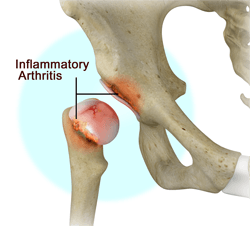
What is Inflammatory Arthritis of the Hip?
The inflammation of the joints is referred to as arthritis. Inflammation arises when the smooth lining called cartilage at the ends of bones wears away. In some cases, the inflammation is caused when the lining of the joint becomes inflamed as part of an underlying systemic disease. These conditions are referred to as inflammatory arthritis.
Types of Inflammatory Arthritis of the Hip
The most common types of inflammatory arthritic conditions of the hip include:
- Rheumatoid arthritis: systemic disease of the immune system that commonly affects multiple joints on both sides of the body at the same time
- Ankylosing spondylitis: chronic inflammatory disease of the spine and the sacroiliac joints (junction where the spine meets the pelvic bone)
- Systemic lupus erythematosus (SLE): an autoimmune disease in which the body’s immune system attacks its own healthy cells and tissues
Symptoms of Inflammatory Arthritis of the Hip
The typical symptom of arthritis is joint pain. Inflammatory hip arthritis is mainly characterized by an aching pain in the groin region, outer thighs or buttocks. The pain is commonly most severe in the morning and sometimes lessens with activity during the day. Vigorous activities may result in increased pain and stiffness, and limit your movement, making walking difficult.






